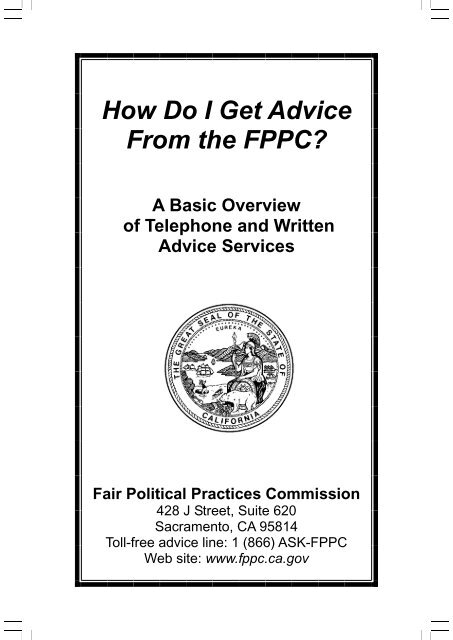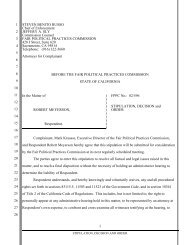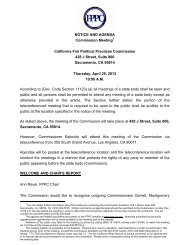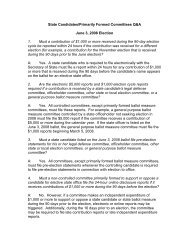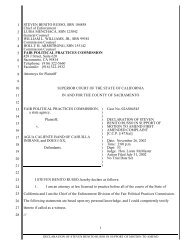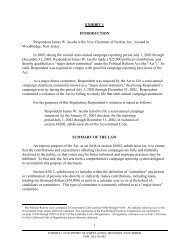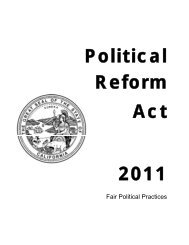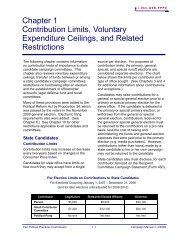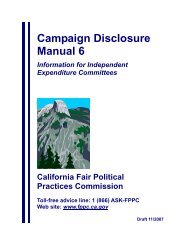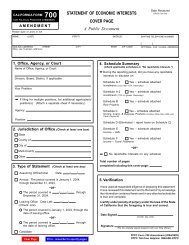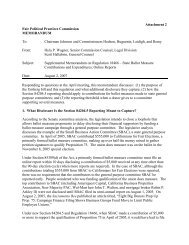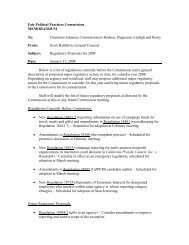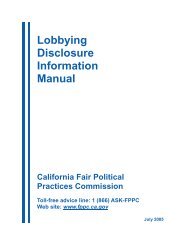How Do I Get Advice From the FPPC? - Fair Political Practices ...
How Do I Get Advice From the FPPC? - Fair Political Practices ...
How Do I Get Advice From the FPPC? - Fair Political Practices ...
Create successful ePaper yourself
Turn your PDF publications into a flip-book with our unique Google optimized e-Paper software.
<strong>How</strong> <strong>Do</strong> I <strong>Get</strong> <strong>Advice</strong><br />
<strong>From</strong> <strong>the</strong> <strong>FPPC</strong>?<br />
A Basic Overview<br />
of Telephone and Written<br />
<strong>Advice</strong> Services<br />
<strong>Fair</strong> <strong>Political</strong> <strong>Practices</strong> Commission<br />
428 J Street, Suite 620<br />
Sacramento, CA 95814<br />
Toll-free advice line: 1 (866) ASK-<strong>FPPC</strong><br />
Web site: www.fppc.ca.gov
<strong>Fair</strong><br />
<strong>Political</strong><br />
<strong>Practices</strong><br />
Commission<br />
<strong>How</strong> <strong>Do</strong> I <strong>Get</strong> <strong>Advice</strong><br />
<strong>From</strong> <strong>the</strong> <strong>FPPC</strong>?<br />
“I’m running for city council.<br />
What campaign reports do I need to file?”<br />
“My home is near <strong>the</strong> proposed park. Can I vote on <strong>the</strong><br />
issue at next month’s planning commission meeting?”<br />
“I was just appointed to a government commission. <strong>Do</strong> I<br />
need to disclose my personal financial interests?”<br />
Many of you in <strong>the</strong> public and political arenas may<br />
have faced similar questions. But where can you turn for<br />
advice?<br />
The <strong>Fair</strong> <strong>Political</strong> <strong>Practices</strong> Commission administers<br />
and enforces <strong>the</strong> <strong>Political</strong> Reform Act – <strong>the</strong> state law governing<br />
campaign finances, lobbying, conflicts of interest,<br />
gift limits, and post-government employment restrictions.<br />
If you have a specific question about how <strong>the</strong> <strong>Political</strong><br />
Reform Act applies to you, you should consult <strong>the</strong> Act,<br />
<strong>FPPC</strong> regulations and your legal counsel – and you can<br />
ask <strong>the</strong> <strong>FPPC</strong> for telephone or written advice. We answer<br />
thousands of calls for telephone advice monthly, issue<br />
hundreds of advice letters each year and host educational<br />
seminars around <strong>the</strong> state.<br />
The Act is found in California Government Code sections<br />
81000-91014. <strong>FPPC</strong> regulations are contained in<br />
Title 2, Division 6 of <strong>the</strong> California Code of Regulations.<br />
<strong>FPPC</strong> 1 (Revised 8/03)
<strong>FPPC</strong><br />
Toll-free<br />
<strong>Advice</strong><br />
Line:<br />
1-866-ASK-<strong>FPPC</strong><br />
(1-866-275-3772)<br />
The <strong>FPPC</strong> web site, www.fppc.ca.gov, offers <strong>the</strong> Act and<br />
regulations as well as fact sheets, forms, meeting agendas,<br />
schedules of upcoming seminars and o<strong>the</strong>r helpful<br />
documents and publications. <strong>FPPC</strong> staff members conduct<br />
training seminars throughout <strong>the</strong> state on such topics<br />
as campaign treasurer duties and conflicts of interest.<br />
The <strong>FPPC</strong> also offers a toll-free help number for those<br />
with obligations under <strong>the</strong> <strong>Political</strong> Reform Act – 1-866-<br />
ASK-<strong>FPPC</strong> (1-866-275-3772).<br />
Generally, telephone advice is more appropriate for<br />
routine inquiries, while written advice or formal Commission<br />
opinions are more suitable for complex inquiries and<br />
issues under <strong>the</strong> <strong>Political</strong> Reform Act. Seminars are intended<br />
to provide a general introduction and overview of<br />
your obligations, such as tips on how to fill out campaign<br />
disclosure forms.<br />
<strong>FPPC</strong> 2 (Revised 8/03)
Who can ask for advice?<br />
A public official, designated employee, candidate, lobbyist<br />
or o<strong>the</strong>r person who has duties or obligations under<br />
<strong>the</strong> Act (or his or her authorized representative) can ask<br />
<strong>the</strong> <strong>FPPC</strong> for telephone or written advice. Examples of<br />
authorized representatives include city attorneys, campaign<br />
treasurers, lawyers, and agency counsels.<br />
Examples of <strong>the</strong> types of questions frequently received<br />
by <strong>the</strong> <strong>FPPC</strong> include:<br />
“Can I vote on <strong>the</strong> mall expansion plan at next<br />
month’s meeting?”<br />
“<strong>How</strong> do I report this contribution?”<br />
“What sender identification should I put on my campaign<br />
mailer?”<br />
No third-party advice<br />
If you are calling or writing to ask about someone<br />
else’s actions, and you are not authorized to represent<br />
that person, <strong>the</strong> <strong>FPPC</strong>’s Technical Assistance Division<br />
and Legal Division cannot give you advice about <strong>the</strong> requirements<br />
of <strong>the</strong> Act. For example, we would not be able<br />
to provide advice if your fellow planning commissioner<br />
voted for a project and you suspect he or she may have<br />
had a conflict of interest.<br />
If you think someone may have violated a provision of<br />
<strong>the</strong> Act, you may file a complaint with <strong>the</strong> Enforcement<br />
Division. The toll-free <strong>FPPC</strong> enforcement hot-line number<br />
is 1-800-561-1861. See <strong>the</strong> <strong>FPPC</strong> fact sheet on filing a<br />
complaint and <strong>the</strong> <strong>FPPC</strong> brochure, “What Happens After I<br />
File A Complaint With The <strong>FPPC</strong>?” Both are available on<br />
<strong>FPPC</strong> 3 (Revised 8/03)
<strong>the</strong> web site, www.fppc.ca.gov, or by calling toll-free 1-<br />
866-ASK-<strong>FPPC</strong>.<br />
More details<br />
about <strong>FPPC</strong> telephone advice<br />
As far in advance of <strong>the</strong><br />
action as possible, call <strong>the</strong><br />
<strong>FPPC</strong>’s toll-free help line (1-866-<br />
ASK-<strong>FPPC</strong>) and speak with one<br />
of <strong>the</strong> consultants in <strong>the</strong> Technical<br />
Assistance Division.<br />
Consultants are available Monday<br />
through Friday (except holidays)<br />
from 9:00 a.m. until noon<br />
and 1:30-4:30 p.m. During exceptionally<br />
busy periods, you<br />
may have to hold for an available consultant, or you can<br />
leave a message and a consultant will call you back. If<br />
you call after regular business hours, you can leave your<br />
name, telephone number and <strong>the</strong> nature of your call, and<br />
a consultant will contact you <strong>the</strong> next business day.<br />
When will I get an answer? Most calls for telephone<br />
advice are answered on <strong>the</strong> same day. If you are calling<br />
during an exceptionally busy period — such as before a<br />
statement filing deadline or an election — or if <strong>the</strong> consultant<br />
needs to conduct research, a response to your call<br />
may take longer. If your question is factually complicated<br />
or presents a novel issue we have not advised on before,<br />
<strong>the</strong> consultant may not be able to give telephone advice<br />
and may ask you to request written advice instead.<br />
<strong>Do</strong>es telephone advice provide immunity? No.<br />
Telephone advice can provide you with valuable guidance<br />
and answers to routinely asked questions under <strong>the</strong> Act.<br />
But telephone advice does not provide <strong>the</strong> caller with im-<br />
<strong>FPPC</strong> 4 (Revised 8/03)
munity from prosecution under <strong>the</strong> Act. Only formal written<br />
advice confers limited statutory immunity on <strong>the</strong> requestor<br />
(California Government Code section 83114).<br />
<strong>Do</strong>es <strong>the</strong> Commission provide written confirmation<br />
of telephone advice? No. You have <strong>the</strong> choice of<br />
requesting telephone or written advice. If you choose telephone<br />
advice, <strong>the</strong> Commission will not provide written<br />
confirmation.<br />
May <strong>the</strong> <strong>FPPC</strong> decline to provide advice? If a question<br />
concerns past conduct, is purely hypo<strong>the</strong>tical, is not<br />
related to <strong>the</strong> Act, presents vague facts, is too complex, is<br />
third party, or if <strong>the</strong> requestor is asking for anonymous advice,<br />
<strong>the</strong> Commission may decline to provide telephone or<br />
informal written assistance. Or we may limit our assistance<br />
to a general explanation of <strong>the</strong> requirements of <strong>the</strong><br />
Act (Reg. 18329(c)(4)).<br />
If <strong>the</strong> question concerns an individual’s disclosure<br />
category or filing obligations under an agency’s conflict of<br />
interest code, <strong>the</strong> individual must first request a determi-<br />
Call as far in<br />
advance of <strong>the</strong> action<br />
as possible — not<br />
after <strong>the</strong> fact!<br />
<strong>FPPC</strong> 5 (Revised 8/03)
nation from his or her agency and/or <strong>the</strong> agency’s code<br />
reviewing body (Reg. 18329.5). (This process is outlined<br />
beginning on page 11 of this brochure.)<br />
More details about <strong>FPPC</strong> written advice<br />
If you have a more complicated or non-routine question,<br />
or are seeking limited immunity, you may want to request<br />
written advice from <strong>the</strong> <strong>FPPC</strong>. To request written<br />
advice, write a letter to:<br />
General Counsel<br />
<strong>Fair</strong> <strong>Political</strong> <strong>Practices</strong> Commission<br />
428 J Street, Suite 620<br />
Sacramento, CA 95814<br />
Your letter should include <strong>the</strong> following information:<br />
Your name, title or position, mailing address, and<br />
daytime telephone number. If you are requesting<br />
advice on behalf of someone o<strong>the</strong>r than yourself, <strong>the</strong><br />
letter must specifically state that you are authorized to<br />
represent that person.<br />
The question. Clearly state <strong>the</strong> question(s) you want<br />
answered.<br />
The facts. Provide all of <strong>the</strong> material facts and information<br />
related to your question in a clear and concise<br />
manner. Summarize relevant parts of attachments<br />
and enclosures in <strong>the</strong> request.<br />
Some frequently asked questions about written advice<br />
include:<br />
What is <strong>the</strong> difference between “formal” and<br />
“informal” written advice?<br />
“Formal” written advice letters from <strong>the</strong> <strong>FPPC</strong> apply<br />
provisions of <strong>the</strong> <strong>Political</strong> Reform Act to very specific fac-<br />
<strong>FPPC</strong> 6 (Revised 8/03)
tual situations involving particular public officials.<br />
“Informal” written advice letters provide answers to general<br />
questions about <strong>the</strong> Act. Requests for written advice<br />
that seek general guidance and do not provide specific<br />
facts are treated as requests for informal written assistance.<br />
Formal written advice confers limited immunity on<br />
<strong>the</strong> requestor; informal written advice does not. Formal<br />
written advice is noted by <strong>the</strong> file prefix “A” in <strong>the</strong> <strong>FPPC</strong><br />
file number of <strong>the</strong> letter, and informal written advice is<br />
noted by <strong>the</strong> prefix “I.”<br />
When will I get an answer?<br />
The Act directs <strong>the</strong> Commission to respond to a request<br />
for “formal” written advice within 21 business days<br />
of receipt. If a staff member needs to contact you to get<br />
more facts to prepare <strong>the</strong> reply, or if your request poses a<br />
particularly complex legal question, <strong>the</strong> 21-day period<br />
may be extended. The 21-day deadline does not apply to<br />
“informal” written advice.<br />
What happens to a request for written advice once<br />
<strong>the</strong> <strong>FPPC</strong> receives it?<br />
Upon receiving your request, <strong>the</strong> Commission sends<br />
you a written acknowledgment that provides <strong>the</strong> name of<br />
<strong>the</strong> staff person who will prepare <strong>the</strong> response. Commis-<br />
<strong>FPPC</strong> 7 (Revised 8/03)
sion staff may contact you to request additional facts or<br />
information needed to answer your request. Outgoing advice<br />
letters are reviewed and approved by a senior staff<br />
counsel, <strong>the</strong> General Counsel, or both.<br />
Once issued, are advice letters made public?<br />
Yes. The Commission publishes advice letter summaries<br />
in its Bulletin newsletter. We send copies of <strong>the</strong> advice<br />
letters to <strong>the</strong> Attorney General, Secretary of State,<br />
<strong>the</strong> Franchise Tax Board and private parties who have<br />
paid subscriptions. The advice letters are published on<br />
Westlaw and Lexis and are made available to interested<br />
parties on request.<br />
<strong>Do</strong>es written advice provide immunity?<br />
Formal written advice based upon accurate and complete<br />
facts provides immunity to <strong>the</strong> requestor from any<br />
enforcement action initiated by <strong>the</strong> Commission and is<br />
evidence of good faith in any o<strong>the</strong>r proceeding if <strong>the</strong> requestor<br />
relies upon <strong>the</strong> advice in good faith (section<br />
83114(b)). Formal written advice is not a declaration of<br />
policy by <strong>the</strong> Commission. It is <strong>the</strong> application of law to a<br />
particular set of facts. Though <strong>the</strong> advice may provide<br />
guidance to o<strong>the</strong>rs, <strong>the</strong> immunity provided by formal written<br />
advice is limited to <strong>the</strong> requestor under <strong>the</strong> specific<br />
facts described in <strong>the</strong> letter. As discussed above, telephone<br />
advice and informal written advice do not confer<br />
immunity on <strong>the</strong> requestor.<br />
May a requestor ask for reconsideration of written advice?<br />
Yes. The request for reconsideration should be made<br />
to <strong>the</strong> General Counsel. If <strong>the</strong> requestor wishes <strong>the</strong> commissioners<br />
to consider <strong>the</strong> matter, he or she should so<br />
state and <strong>the</strong> letter may be placed on <strong>the</strong> Commission’s<br />
agenda for consideration.<br />
May <strong>the</strong> Commission decline to provide advice?<br />
The Commission may decline to provide formal written<br />
<strong>FPPC</strong> 8 (Revised 8/03)
advice if <strong>the</strong> requestor does not provide all of <strong>the</strong> material<br />
facts. The Commission may also decline to provide formal<br />
written advice if <strong>the</strong> request relates to past conduct, does<br />
not relate to <strong>the</strong> Act, is purely hypo<strong>the</strong>tical, or presents<br />
issues requiring a policy interpretation best made through<br />
a Commission opinion or adoption of a regulation (Reg.<br />
18329(b)(8)).<br />
In certain situations involving advice regarding an individual’s<br />
disclosure category or filing obligations under an<br />
agency’s conflict of interest code, <strong>the</strong> individual must first<br />
request a determination from his or her agency and/or <strong>the</strong><br />
agency’s code reviewing body (Reg. 18329.5). (This process<br />
is outlined beginning on page 11 of this brochure.)<br />
Tips for advice-seekers:<br />
Ask for advice before you<br />
act. <strong>FPPC</strong> staff members can<br />
provide you with telephone or<br />
written advice about future<br />
conduct only, not about actions<br />
already taken. Similarly, staff<br />
members do not provide advice<br />
about matters in litigation<br />
or about which a complaint has<br />
been filed with <strong>the</strong> <strong>FPPC</strong>.<br />
Call or write as early as possible<br />
in advance of your<br />
deadline. Our staff members<br />
make every effort to respond<br />
within your time frame. But some questions may raise<br />
complex issues that require research, so try to call or<br />
write as early as possible prior to <strong>the</strong> action in question.<br />
Describe <strong>the</strong> facts fully. To receive <strong>the</strong> most accurate<br />
advice possible, identify yourself and <strong>the</strong> official<br />
<strong>FPPC</strong> 9 (Revised 8/03)
<strong>FPPC</strong> On Line<br />
www.fppc.ca.gov<br />
The <strong>FPPC</strong> has expanded and upgraded its web<br />
site. The emphasis is not on flashy graphics but on<br />
providing users with <strong>the</strong> most complete, up-to-date<br />
information possible.<br />
The site includes, among o<strong>the</strong>r things:<br />
• E-mail subscription lists for <strong>FPPC</strong> publications,<br />
Interested Persons materials, and agendas<br />
• Fact sheets outlining <strong>the</strong> rules concerning: campaign<br />
disclosure, lobbyists, conflicts of interest,<br />
and gift limitations<br />
• <strong>Do</strong>wnloadable forms and publications<br />
• The <strong>Political</strong> Reform Act<br />
• <strong>FPPC</strong> regulations, including newly adopted rules<br />
• Meeting agendas and summaries<br />
• Current and past issues of <strong>the</strong> <strong>FPPC</strong> Bulletin<br />
• Summaries of enforcement decisions<br />
<strong>FPPC</strong> 10 (Revised 8/03)
or entities involved, state a clear question, and provide<br />
as many facts as possible. Examples include:<br />
♦ For campaign reporting questions, identify <strong>the</strong><br />
candidate, committee name and type, and describe<br />
your activity in detail.<br />
♦ For questions relating to conflicts of interest,<br />
identify <strong>the</strong> public official involved, <strong>the</strong> governmental<br />
decision <strong>the</strong> official is making, and <strong>the</strong><br />
official’s economic interests (property, income,<br />
or gifts) that may cause a conflict of interest.<br />
We can’t provide advice on hypo<strong>the</strong>tical situations.<br />
Ask for advice about a real transaction you plan<br />
to undertake or a specific decision coming before you.<br />
<strong>FPPC</strong> staff members cannot provide advice about<br />
speculative “what-if” scenarios.<br />
Check previous <strong>FPPC</strong> advice letters. We may have<br />
already answered a question similar to yours in a previous<br />
advice letter. The Commission’s advice letters<br />
are available through <strong>the</strong> legal research services<br />
Westlaw and Lexis.<br />
<strong>Advice</strong> involving agency<br />
conflict of interest codes<br />
If you need advice about your filing obligations under<br />
your agency’s conflict of interest code, you must<br />
first request a determination from your agency and your<br />
agency’s code reviewing body (if different than <strong>the</strong><br />
<strong>FPPC</strong>), before you request assistance from <strong>the</strong> <strong>FPPC</strong><br />
(Reg. 18329.5(a)(3)(A)). Examples could include questions<br />
about whe<strong>the</strong>r your employment position should be<br />
included under your agency’s code, or <strong>the</strong> extent to which<br />
you are required to disclose your financial interests.<br />
<strong>FPPC</strong> 11 (Revised 8/03)
Likewise, an agency with questions about its conflict of<br />
interest code must first request a determination from its<br />
code reviewing body before contacting <strong>the</strong> <strong>FPPC</strong>, if that<br />
code reviewing body is not <strong>the</strong> <strong>FPPC</strong> (Reg. 18329.5(a)(3)<br />
(B)). If you would like more information about this process or<br />
how to determine who is your code reviewing body, you may<br />
contact <strong>the</strong> <strong>FPPC</strong>’s Technical Assistance Division at our tollfree<br />
number.<br />
Once you have sought a determination from your agency<br />
and code reviewing body, and if you still have questions or<br />
need assistance, you may contact <strong>the</strong> <strong>FPPC</strong> for advice. You<br />
may be asked by <strong>FPPC</strong> staff to provide certain information,<br />
including a copy of all pertinent agency determinations regarding<br />
your disclosure obligations, a copy of your duty<br />
statement and employment contract, a copy of <strong>the</strong> conflict of<br />
interest code at issue, and any o<strong>the</strong>r pertinent information.<br />
The process outlined above does not prohibit <strong>the</strong><br />
<strong>FPPC</strong> from providing you with technical assistance on complying<br />
with your reporting requirements under your agency’s<br />
current conflict of interest code.<br />
Also, <strong>the</strong> process outlined above does not prohibit <strong>the</strong><br />
<strong>FPPC</strong> from, at any time, providing advice on whe<strong>the</strong>r an individual<br />
is considered a “public official who manages public<br />
investments” under <strong>the</strong> <strong>Political</strong> Reform Act (Reg. 18329.5<br />
(c); California Government Code section 87200).<br />
Please note that if you are potentially subject to a conflict of<br />
interest code, you may petition your agency to amend its<br />
code. You may appeal a denied petition to your agency’s<br />
code reviewing body, and you may also seek judicial review<br />
of any action taken by <strong>the</strong> code reviewing body (California<br />
Government Code sections 87307 and 87308).<br />
Commission Opinions<br />
The Commission, following a process outlined in its<br />
regulations, may issue formal opinions. Such opinions typically<br />
involve matters of significant public interest and sub-<br />
<strong>FPPC</strong> 12 (Revised 8/03)
stantial questions of interpretation of <strong>the</strong> <strong>Political</strong> Reform<br />
Act.<br />
The procedure for requesting and issuing formal opinions<br />
is detailed in <strong>FPPC</strong> Regulations 18320-18326.<br />
Requesting an opinion<br />
Requests for formal opinions may be submitted to <strong>the</strong><br />
Commission by any person whose duties under <strong>the</strong> Act are<br />
in question, or that person’s authorized representative.<br />
The procedure for requesting a formal opinion, and <strong>the</strong><br />
Commission’s procedure for granting or denying such requests,<br />
is outlined in Regulation 18320.<br />
To request a formal opinion, write a letter to:<br />
Executive Director<br />
<strong>Fair</strong> <strong>Political</strong> <strong>Practices</strong> Commission<br />
428 J Street, Suite 620<br />
Sacramento, CA 95814<br />
Try to state <strong>the</strong> question and all relevant facts as concisely<br />
as possible. The executive director determines<br />
whe<strong>the</strong>r to grant or deny opinion requests. A denial can be<br />
appealed by <strong>the</strong> person requesting <strong>the</strong> opinion.<br />
Requests for opinions received by <strong>the</strong> <strong>FPPC</strong> are public<br />
records and are open to public inspection.<br />
Public hearings held<br />
When <strong>the</strong> Commission has agreed to issue an opinion, a<br />
public hearing is held. The opinion requestor, interested<br />
persons and members of <strong>the</strong> public are given an opportunity<br />
to provide both written and oral input before <strong>the</strong> opinion is<br />
adopted.<br />
The Commission adopts formal opinions at a public<br />
meeting. Before <strong>the</strong> meeting, a draft of <strong>the</strong> opinion is provided<br />
to members of <strong>the</strong> Commission, <strong>the</strong> person requesting<br />
<strong>FPPC</strong> 13 (Revised 8/03)
<strong>the</strong> opinion, <strong>the</strong> state Attorney General, <strong>the</strong> Franchise<br />
Tax Board, <strong>the</strong> Secretary of State and o<strong>the</strong>r interested<br />
persons, and is made available to <strong>the</strong> public.<br />
Opinions published<br />
Opinions adopted by <strong>the</strong> Commission, along with any<br />
dissenting or concurring opinions by commissioners, are<br />
public and are published on Westlaw and Lexis.<br />
May <strong>the</strong> person requesting <strong>the</strong> opinion ask for a rehearing?<br />
Yes. Within 14 days after <strong>the</strong> adoption of a formal<br />
opinion by <strong>the</strong> Commission, <strong>the</strong> person who submitted<br />
<strong>the</strong> opinion request, a commissioner or <strong>the</strong> executive director<br />
may petition <strong>the</strong> Commission to grant a rehearing.<br />
The purposes of California’s <strong>Political</strong> Reform Act<br />
are described in <strong>the</strong> initiative’s preamble,<br />
including:<br />
“Receipts and expenditures in election campaigns<br />
should be fully and truthfully disclosed in order that<br />
<strong>the</strong> voters may be fully informed and improper practices<br />
may be inhibited.”<br />
“The activities of lobbyists should be regulated and<br />
<strong>the</strong>ir finances disclosed in order that improper influences<br />
will not be directed at public<br />
officials.”<br />
“Assets and income of public officials which may be<br />
materially affected by <strong>the</strong>ir official actions should be<br />
disclosed and in appropriate<br />
circumstances <strong>the</strong> officials should be disqualified<br />
from acting in order that conflicts of interest may be<br />
avoided.”<br />
<strong>FPPC</strong> 14 (Revised 8/03)
<strong>How</strong> To Contact Us:<br />
By mail:<br />
<strong>Fair</strong> <strong>Political</strong> <strong>Practices</strong><br />
Commission<br />
428 J Street, Suite 620<br />
Sacramento, CA 95814<br />
Internet:<br />
www.fppc.ca.gov<br />
By telephone:<br />
Toll-free advice line:<br />
1-866-ASK-<strong>FPPC</strong><br />
(1-866-275-3772)<br />
Regular line: 1-916-322-5660<br />
Enforcement hot line:<br />
1-800-561-1861<br />
California<br />
<strong>Fair</strong> <strong>Political</strong> <strong>Practices</strong> Commission


